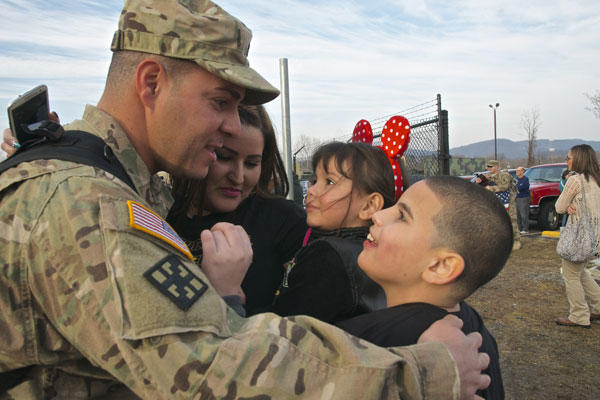You’ve spent months looking forward to this moment: Reunion. After all that build-up, it’s impossible not to have high hopes for a magical moment. And that first hello? It really is magical. But after reunion comes reintegration -- and while both are exciting, reintegration is harder than it looks.
Here are some tried-and-true tips for how to make reunion and reintegration a little easier on everyone.
Temper Your Expectations
We have no bad news to break to you -- just reality. That first kiss back can be an amazing one, but it can also be awkward. (Nine months or a year of no kissing can do that.) So while everyone is counting on the magical, storybook return, just try to make sure you’re ready for real life, too.
For starters, everyone will have changed. That’s a reality that has taken every military spouse by surprise at one point or another. But an extended period apart -- especially one so emotionally significant -- will change both you and your partner. Your kids will have grown and changed, too. These changes may come as a surprise, and while they may create some tension at first, soon they will become routine.
At first, the giddy excitement of being back together will dominate your reunion. Those initial feelings of excitement and anticipation may wear off as you notice any changes in each other. If you find yourself reacting poorly, don’t be surprised: the shock of change may come hand-in-hand with some resentment. Regardless of the challenges, you may think the other had it easier -- after all, one of you wasn’t shot at, and the other wasn’t solo parenting without a partner.
Remember deployment is hard on everyone. That includes your children: while they are delighted to have their family back together, they may openly express their anger at having been separated in the first place. All of these feelings are normal. All of these feelings will pass.
Keep in mind that dangerous or long deployments can create their own special toll, as can those during which money problems, communication problems, or relationship and trust issues are present. Be on the lookout for those, and if you think you might fall into this category, consider reaching out for help -- just so you have a sounding board to keep you thinking clearly.
So how do you maintain that initial feeling of reunion happiness? Match your expectations to reality.
The Actual Reunion
Keep the reunion porn (our term for those oh-so-sappy, outside of reality, TV-ready reunions) on Pinterest, and prepare for reality at home. Despite how happy your spouse is to return to you, he or she will probably come home exhausted, anxious, jetlagged, emotionally overwhelmed, and quite possibly with a huge to-do list from work.
Account for that as you imagine how things will go in your head, and prepare yourself for the inevitably unpredictable timing. Bad weather, late flights, family emergencies, missed phone calls, incorrect passenger lists -- any number of these things can happen, and your perfect moment may be at a time you didn’t expect. Don’t be crushed when you’re facing an unexpected week delay, and don’t stress yourself out when suddenly that flight is coming in three days early. These things happen.
Do your best to learn and communicate the details of the return plan in advance, and make sure you stay in touch with your Family Readiness Officer about any changes to that plan. Make sure you have a backup plan for whatever may come up -- a late flight that conflicts with school pick-up, an unexpectedly early return timed when you’re supposed to be at work.
You may have a huge celebration planned, and if the arrival is delayed at all, you may find your plans on the backburner. Or worse, you may discover your spouse just wants some quiet time to process what he or she has gone through and to get used to the rhythms of being home. Whatever you envision, clear it with your returning spouse before you plan it. If you are hell-bent on a fantastic surprise, remember: Surprises don’t always go as planned and prepare yourself for a reaction that wasn’t what you anticipated. While it might be an absolute hit, you want to make sure you account for the opposite possibility, too.
Even a small celebration can go a long way -- a banner, favorite meal, small things like this will make your service member feel appreciated. If he or she is too tired to notice at first, don’t be concerned. We all feel exhausted after long trips home - what we don’t notice right away, we do notice eventually!
The First Week
You’ve done it all while he or she was gone, and you have a new rhythm to your house that’s worked smoothly. What has gotten you through deployment, though, will not get you through reintegration. Be upfront with your spouse about any changes in the family schedules like dropped naps and new bedtimes.
Right away, prepare yourself to share the responsibilities you've borne alone. Now that your service member is back, sit down and have a conversation about who will do what now that both of you are present. Your service member may want to ease back into the family routine, or he or she may want to take over their share all at once. Be prepared for both, and be supportive.
Expect to feel like someone new is in the house. It’s your spouse alright, but all that time - and anything significant that happened during it -- can make the intimacy you’re so used to feel a little further away. After a long absence, it’s important to take time to get to know each other again, so find a way to carve out some time for you. If it’s a special date night or just time on the couch after the kids are asleep, focus on re-meeting the person you married.
A Few Hard-Earned Tips From Other Spouses:
Don’t over-schedule the first week. Sometimes the shock of going from deployment routine to family routine can be enough to swallow without adding in a constant list of places to be. Make sure you give your spouse some downtime.
Don’t expect your spouse to intuit what he or she is supposed to do for chores. You’re both out of rhythm on how to share the household to-do list, and it’ll take some time to equilibrate.
Spend some time talking with each other. Since you both have changed, make sure you are open and ready to listen to the new things your spouse has experienced and felt during deployment. Communication is the bedrock of intimacy.
Expect your children to test the limits. With both parents present, children will be more inclined to push the rules more than usual. Make sure you discuss any new rules that have been set in your service member’s absence and do your best to remain a united front.
Watch your spending. It’s so tempting to celebrate a reunion in all the big ways. To throw a big party, plan a big trip to see the family, spend deployment pay on that desperately-wanted new car. Remember: Reunions are special because the service member is now home. They aren’t special because of what you purchased.
Over Time
Adjustment takes awhile. Just like it takes nine months to make a baby and nine months to get your pre-baby body back, it’ll take a good long while before your household has returned to normal. Do not be alarmed when this doesn’t happen right away.
Sharing household responsibilities, working with finances and even sex can all be sources of tension for a while. As you re-establish your family routine, you may find that one or both of you feel unwanted and unappreciated. It is common for people to overreact as they readjust to life as a couple. Make sure communication is your best friend. Talking through the other’s needs and expectations can help mitigate any sore feelings. An open environment is a more intimate one.
Talking through these adjustments can be harder if the service member has seen or experienced violent action during deployment. War is often an ugly business, with many innocent victims, and the experience of war may be hard to talk about, even years later. In time, the service member may want to discuss some of these things if others are willing to listen patiently, without judging. Remember: You’ve spent the last few months growing apart. It’s up to you to grow back together.
If you worry that reintegration is posing more of a toll on your marriage than you or your partner know how to handle, don’t hesitate to reach out for help. Sometimes talking to someone with no dog in the fight can help clear the air.
Maybe you will be lucky, and your spouse’s return will be Storybook Perfect and without a single stumbling block. If it isn’t, keep in mind: none of this was meant to be easy. But with realistic expectations, open lines of communication, and an open heart, your integration can have a Storybook ending.
Keep Up with the Ins and Outs of Military Life
For the latest military news and tips on military family benefits and more, sign up for a free Military.com membership and have the information you need delivered directly to your inbox.





















